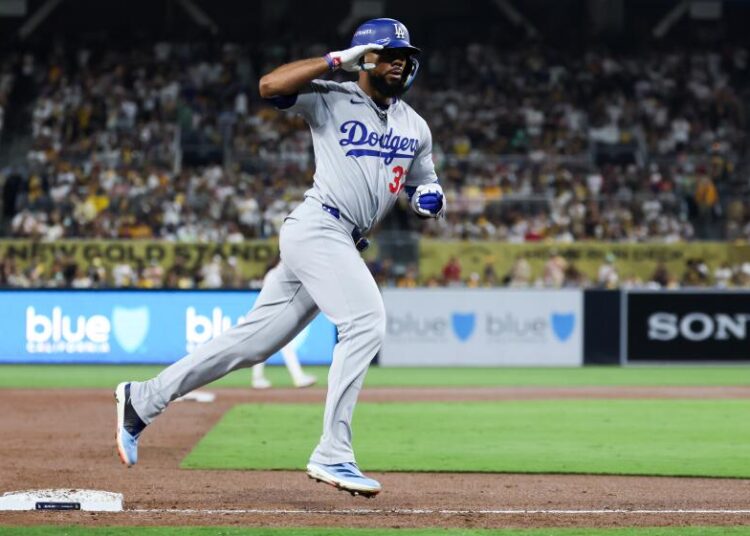Just how valuable is Teoscar Hernández to the Dodgers?
Shohei Ohtani is baseball’s most valuable player. Mookie Betts and Freddie Freeman are superstars too.
Yoshinobu Yamamoto, Tyler Glasnow and Blake Snell are among baseball’s top pitchers. Roki Sasaki will be too, and the Dodgers might sign him too.
Hernández would rank behind all of them, joining Max Muncy and Will Smith atop the supporting cast.
It’s a star-studded supporting cast, of course. Hernández hit 33 home runs last season, the most of any National League outfielder. He batted cleanup in the clinching game of the World Series, driving in the final two runs of that fateful five-run fifth inning at Yankee Stadium.
Read more: Plaschke: Fans are heard, title hopes are solidified, Teoscar Hernández is back with Dodgers
But think about this: With Friday’s agreement to bring back Hernández, the Dodgers are liable for more than $45 million in new financial commitments next year, all to secure the services of someone who might be no better than their eighth-best player.
Talk about commitment to excellence. The Dodgers live that slogan every day.
The Raiders, the team that claims that slogan as its own? They have not won a playoff game in 21 years. They have not won a Super Bowl in 40 years.
Vision without execution is just happy talk. Critics scoffed when Mark Walter and the Dodgers’ ownership group paid $2 billion to buy the team — Forbes estimated the franchise value at less than half that — but Walter and Co. bet they could find gold in local broadcast rights. They did, for $8.35 billion.
Critics denounced the Dodgers when Walter and Co. committed $700 million to Ohtani last year. They might net a profit on the contract. They already netted a championship.
The Dodgers already had passed the most punitive luxury tax threshold for next season, so they are liable for a 110% penalty on the average annual value of Hernández’s three-year, $66-million contract. After a modest discount to account for deferrals, that’s about $22 million next year. The signing bonus is $23 million — all payable next year, according to a source familiar with the contract.
Add it up, and that’s a $45-million commitment before paying Hernández a single dollar in salary. (Of the $66 million total, the deferrals and the signing bonus account for all but $19.5 million.)
The typical reaction about how much more fans will pay for hot dogs is hopelessly quaint. To be sure, a six pack of Dodger Dogs at the grocery store ($5.99) costs less than a single Dodger Dog at the ballpark ($7.99).
The Dodgers also charged $75 for parking at the World Series. They charge $77.25 for a photo opportunity with the World Series championship trophy, with a press box tour included.
To borrow another slogan the Raiders no longer need: Just win, baby.
Not all teams can spend like the Dodgers, but expanded playoffs mean teams do not have to keep up with the Dodgers all season.
Those teams just have to sneak into the playoffs with 80-some wins — no owner can say with a straight face he cannot afford a team that can do that — and get hot in October. The Dodgers won the World Series this year, but they were eliminated in the division series by an 89-win team in 2022 and an 84-win team in 2023.
That 84-win team, the Arizona Diamondbacks, on Friday agreed to a $210-million contract with star pitcher Corbin Burnes. The Diamondbacks are one of the teams most severely influenced by the implosion of regional sports networks, but the drop in television revenue did not stop them from playing to win.
Read more: Teoscar Hernández agrees to three-year, $66-million deal with the Dodgers
The Dodgers play in the second-largest market in the major leagues. In Chicago, the third-largest market in the majors and the only major market represented in either of the Central divisions, the Cubs and White Sox need better management.
In each of the past six full seasons, the Milwaukee Brewers — playing in the smallest market in the majors — have posted a better record than the Cubs. The White Sox this year lost 121 games, a modern major league record, and attracted fewer fans than any American League team besides the Tampa Bay Rays and the on-our-way-out-of-Oakland Athletics.
In two other major markets, it is notable that teams that posted mostly losing records for years and now are run by former major leaguers — Buster Posey in San Francisco and Craig Breslow in Boston — are spending to win.
It also is notable that the most punitive luxury tax threshold has a nickname, in recognition of the owner his peers considered most likely to spend beyond it. The nickname is not the Mark Walter tax.
The nickname is the Steve Cohen tax, in honor of the owner of the New York Mets. The richest contract in baseball history — Juan Soto for $765 million — is his.
Sign up for more Dodgers news with Dodgers Dugout. Delivered at the start of each series.
This story originally appeared in Los Angeles Times.
Read the full article here



























Discussion about this post